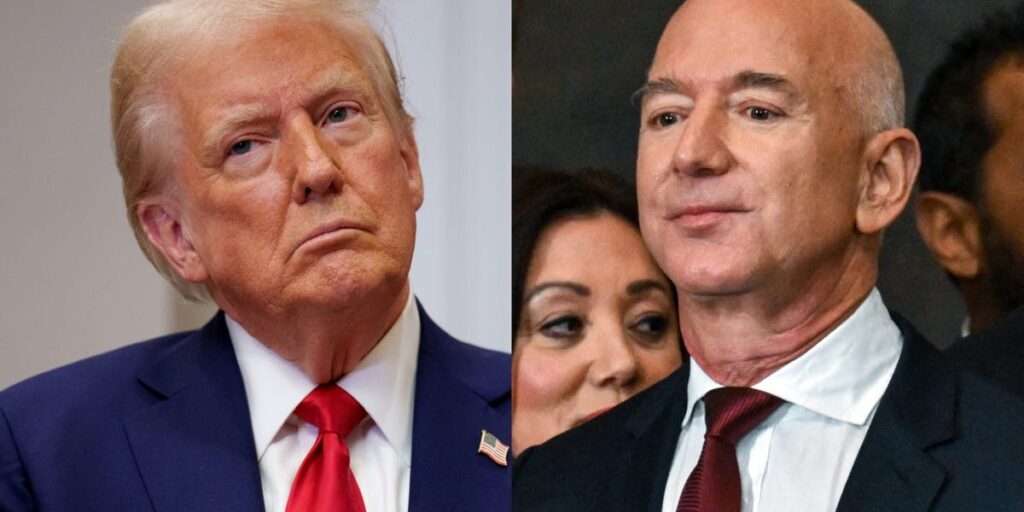President Trump’s return to office has been an earthquake in the news and entertainment business.
Trump and his associates have taken aim at DEI programs in corporate America. He’s revived complaints against TV networks, challenged the funding of public media, and blocked some news outlets from covering events. His proposed tariffs have caused chaos in the global markets, raising the specter of a recession and threatening media and entertainment along with the rest of the business world.
Here’s a closer look at how Trump’s influence has rattled media and entertainment.
News outlets face new attacks
Andrew Harnik/Getty Images
Trump’s influence was felt long before he took office for the second time.
Notably, during the campaign, The Washington Post and Los Angeles Times reversed their long-standing practices of endorsing presidential candidates. This raised concerns inside and outside those papers that the news outlets were self-censoring out of fear of retaliation by Trump. Post owner Jeff Bezos said he made the decision because many people believe the media is biased and presidential endorsements don’t help. Times owner Dr. Patrick Soon-Shiong said he sought to be less divisive in a rocky election year.
Then, during the early days of Trump’s new term, Bezos shook up the paper’s opinion section.
The moves prompted a backlash. There was a staff upheaval and mass subscription cancellations at the Post, and some LA Times members resigned.
While Trump bashes their credibility, mainstream news outlets are scrambling to reverse a protracted decline in audience trust by increasing transparency and deepening engagement. But trust will take a long time to restore, and the shift to digital has weakened the business models of many news outlets, making it harder for them to fight back.
One exception is The New York Times, which is one of the biggest business successes among traditional news outlets. In a post-election memo, it promised to be “unflinching” but “fair” in its coverage of Trump.
Read: NYT, WSJ, NBC, and others tell us how they’re tackling a crisis that’s bigger than Trump
Entertainment feels DEI crackdown
Media and entertainment conglomerates have joined others in corporate America in overhauling their corporate diversity, equity, and inclusion efforts in response to Trump’s DEI crackdown.
Disney’s moves here were notable, as CEO Bob Iger has criticized Trump’s policies in the past and championed liberal themes in Disney’s TV shows and films. That said, even before Trump’s return, Iger had said repeatedly that Disney’s main mission is to entertain rather than advance a political agenda.
As big entertainment companies have cut back on DEI on the business side, creatives and their reps say there’s also been a chill on liberal themes in programming.
Hollywood insiders told BI the shift has taken the form of studio execs asking producers to tweak storylines and characters — or nixing them altogether — and companies backing off past directives to ensure casts were diverse.
Read: Trump is influencing Hollywood like no president before
Tariffs threaten Hollywood’s recovery
Todd Anderson/Getty Images
Many bankers and investors expected Trump’s return to the White House to usher in a pro-business climate favorable for dealmaking. This was particularly relevant in entertainment. The biggest deals at stake were Skydance Media’s long-awaited merger with Paramount Global and Comcast’s plans to spin off most of its NBCUniversal cable channels.
The hopes for an easy climate began to fade quickly, however.
Trump has assailed multiple news outlets, including Comcast’s NBC News. Before the election, he sued Paramount’s CBS, alleging its “60 Minutes” manipulated an interview with former Vice President Kamala Harris in her favor. The suit is pending.
Then Trump ordered sweeping tariffs, which could clobber media and entertainment companies on the advertising and consumer revenue fronts.
Media and entertainment stocks fell on the tariff news. Debt-laden Warner Bros. Discovery and parks-dependent Disney were hit the most while Netflix, protected by its utility-like status, was among those impacted the least.
The tariffs could cause Hollywood, which was already struggling to recover from historic labor strikes, a spending pullback, and the LA fires, to greenlight still fewer shows if they take their toll on consumer spending and production costs.
Read: Meta and Amazon’s ad businesses could get whacked by Trump’s tariffs. Here are the other media companies at risk.



